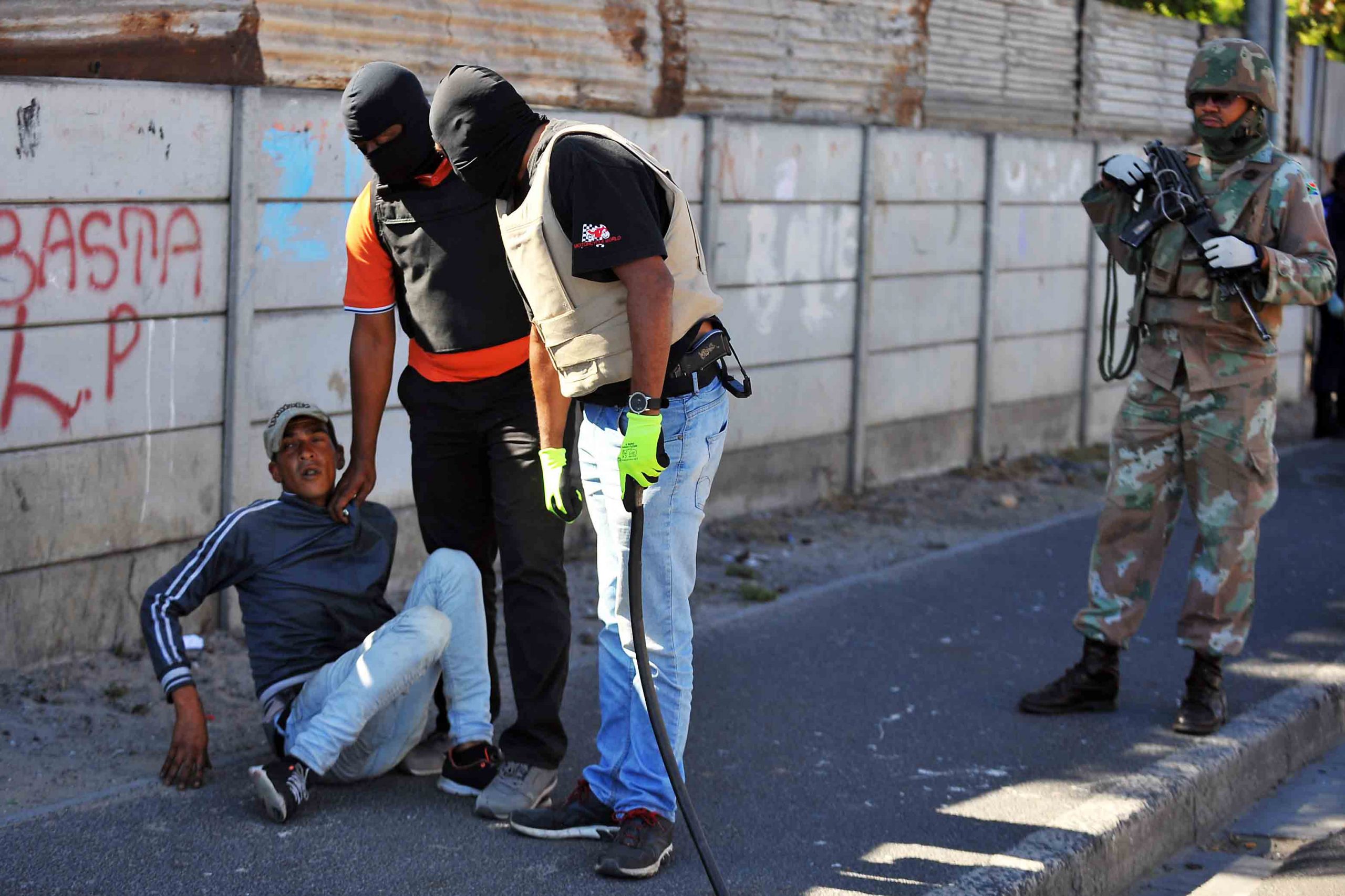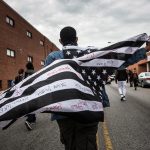State violence is an established reality in SA
Police and military abuses during the Covid-19 lockdown reflect a grim pattern of state violence. Beyond reform, the authoritarian and regressive ideology behind this needs to be challenged.
Author:
3 April 2020

On the first night of South Africa’s 21-day coronavirus lockdown, President Cyril Ramaphosa deployed police and military personnel with a speech that called for restraint towards a terrified populace. He urged them to act “not as a force of might but as a force of kindness”.
Despite these public statements, a clear pattern of violence meted out by the security forces has emerged, particularly in improvised communities where overcrowding and inadequate basic services make obeying the stringent rules of the lockdown especially difficult. By Monday 30 March, when Ramaphosa announced there had been three deaths from the coronavirus, there had also been reports of at least three deaths at the hands of the police. In other words, the state had been matching the virus in lethality.
Along with the killings, there has been a string of reports of the police, military and private security overstepping their mandate. There have been numerous incidents of the police using rubber bullets and in some cases sjamboks, a vicious whip associated with the darkest days of apartheid state violence, to disperse crowds. In other cases, the military have forced people caught outside to do push-ups and other humiliating rituals, while the police have conducted arbitrary raids on people’s homes.
Related article:
In these frightening times, ordinary South Africans also have to contend with the brutality and sadism of armed – and now masked – state forces. But this is not some dystopia that was assembled by decree overnight. The sobering reality is that this state violence is an established reality. South African police terrorising and hunting people is the norm. Using rubber bullets and whips to control people in townships, shack settlements and densely packed urban areas is business as usual.
Despite some achievements in creating public oversight, the post-apartheid security forces continue to be authoritarian, secretive and thuggish. The past decade has seen a marked escalation of state terror in democratic South Africa. Underwritten by the reckless “shoot to kill” and “fight back” statements of politicians like Bheki Cele and Jacob Zuma, the police massacred striking miners at Marikana, dragged people behind vehicles and regularly trampled on the rights of street traders, shack dwellers and student protesters. The reports of the Independent Police Investigative Directorate reveal high incidents of police involvement in murder, rape and suspicious deaths in custody.
A league of thugs
The history of policing in South Africa is a story of extreme violence. During the colonial and apartheid periods, the police and military were naked instruments of white supremacy, a khaki-clad, homegrown Gestapo focused on controlling the politics and movement of black people. A culture of brutal impunity fostered security services staffed by malevolent thugs and brazen criminals.
The democratic transition initially started with high hopes of reforming these fundamentally rotten institutions. Substantial efforts were made to civilianise the police and establish a culture of accountability and public oversight. However, high rates of violent crime, and a rigid and conservative neoliberal policy mindset, saw the government adopt a harshly punitive “war on crime” stance. This was accompanied by the growth of a vast private security sector – itself often implicated in violence and repression.
Related article:
This war on crime has more often translated into a war on the impoverished. The state’s policies and rhetoric are fixated on upholding spatial order, which in practice has translated into aggressive policing of the lower-income and dispossessed majority. In cities like Johannesburg, for example, the police regularly launch military-style operations against informal traders. These raids are often accompanied by sadistic violence and arbitrary, Kafkaesque official justifications. Rather than reducing crime, they actively undermine social entrepreneurship and economic growth.
Alongside a stark escalation in political repression, Zuma’s presidency saw the security forces become increasingly lawless and penetrated by organised crime. Not only has the criminal justice system been drastically undermined, but state forces have also become enablers of social butchery as the bullets and guns that turned parts of the Western Cape into gangland killing fields are primarily sourced from corrupt members of the military and police.
State violence is supported by authoritarian and patriarchal attitudes in South African society. Comments by government officials and people on social media defending violence during the lockdown reveal a persistent belief that the state is entitled to ruthlessly “discipline” the impoverished and vulnerable for even the most minor infractions.
Forces of race and class terror
The micro-fascism of these attitudes sends the message that impoverished – and primarily black – lives don’t matter. It accepts a situation where the South African Police Service and metro police, in particular, are excessively brutal and incompetent at protecting the majority of South Africans from violent crime. The post-apartheid state has established a security system that is proficient at repressing the powerless, but highly constrained in reining in elite political and economic criminals.
In response to the lockdown violence, many commentators are calling for the arrest of truant officers and expanded oversight. These measures are laudable and needed. However, we should remain sceptical of truly transforming the security state into a democratic mechanism for social justice. The violent policing of inequality and social dysfunction is especially brazen in this country, given its deeply entrenched racial, class and gender disparities.
But South Africa is far from unique. The Black Lives Matter movement in the United States and the uprising in Ferguson, Missouri, in 2014 highlighted how, even in ostensibly liberal democracies, the police operate as brute forces of race and class terror.
Related article:
As David Correia and Tyler Wall say in their book Police: A Field Guide, the global history of modern security institutions is not a heroic tale of a thin blue line defending us from crime and chaos. By contrast, these forces were moulded by colonialism, slavery, economic exploitation and the suppression of working-class self-organisation, political dissent and alternative lifestyles. At their core, these institutions are “charged by the state with managing poverty, patrolling the colour line and ruthlessly protecting establishment and economic interest”.
Policing unruly subjects
This is not to say that all police and military officers are miscreants, or that reform and regulations can’t afford some protection from state violence. However, at a fundamental level, the police and military are animated by a vision of order and social control that sees the world as populated by unruly subjects who need to be kept in line by force. As political philosopher Mark Neocleous puts it, the state and capital jointly dream of a world of pacified, pliant workers and consumers, “their minds and bodies docile … secure from resistance, rebellion or revolt”.
The order that the police and military protect is fundamentally antithetical to democracy and egalitarian aspirations. The security forces are not primarily focused on securing our individual and collective freedoms and safety. Instead, as Correia and Wall say, “if you aren’t a large property owner or part of the upper classes, police don’t really care about you or your security and safety. In fact, you are the embodiment of insecurity, of threat, of disorder. You don’t need the protection of law and order, you need protection from law and order.”
The crisis has revealed the cruel face of South African state violence. Along with documenting and challenging abuses of power in this disaster period, it is imperative to rethink what safety and security actually mean. We need democratic public mechanisms that tackle the blights of violence and predatory crime with negotiation, effective governance and robust social safety networks. Otherwise, we will continue this endless downward spiral of the barbaric, colonial logic of rule enforced by the rubber bullet and the sjambok.



